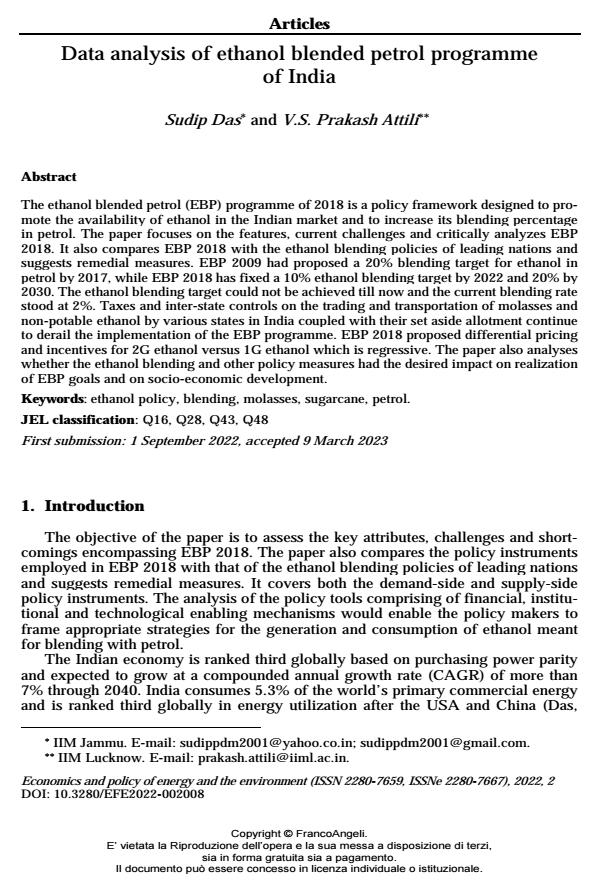Data analysis of ethanol blended petrol programme of India
Titolo Rivista ECONOMICS AND POLICY OF ENERGY AND THE ENVIRONMENT
Autori/Curatori Sudip Das, V.S. Prakash Attili
Anno di pubblicazione 2023 Fascicolo 2022/2
Lingua Inglese Numero pagine 21 P. 171-191 Dimensione file 301 KB
DOI 10.3280/EFE2022-002008
Il DOI è il codice a barre della proprietà intellettuale: per saperne di più
clicca qui
Qui sotto puoi vedere in anteprima la prima pagina di questo articolo.
Se questo articolo ti interessa, lo puoi acquistare (e scaricare in formato pdf) seguendo le facili indicazioni per acquistare il download credit. Acquista Download Credits per scaricare questo Articolo in formato PDF

FrancoAngeli è membro della Publishers International Linking Association, Inc (PILA), associazione indipendente e non profit per facilitare (attraverso i servizi tecnologici implementati da CrossRef.org) l’accesso degli studiosi ai contenuti digitali nelle pubblicazioni professionali e scientifiche.
The ethanol blended petrol (EBP) programme of 2018 is a policy framework designed to pro- mote the availability of ethanol in the Indian market and to increase its blending percentage in petrol. The paper focuses on the features, current challenges and critically analyzes EBP 2018. It also compares EBP 2018 with the ethanol blending policies of leading nations and suggests remedial measures. EBP 2009 had proposed a 20% blending target for ethanol in petrol by 2017, while EBP 2018 has fixed a 10% ethanol blending target by 2022 and 20% by 2030. The ethanol blending target could not be achieved till now and the current blending rate stood at 2%. Taxes and inter-state controls on the trading and transportation of molasses and non-potable ethanol by various states in India coupled with their set aside allotment continue to derail the implementation of the EBP programme. EBP 2018 proposed differential pricing and incentives for 2G ethanol versus 1G ethanol which is regressive. The paper also analyses whether the ethanol blending and other policy measures had the desired impact on realization of EBP goals and on socio-economic development.
Parole chiave:ethanol policy, blending, molasses, sugarcane, petrol.
Jel codes:Q16, Q28, Q43, Q48
Sudip Das, V.S. Prakash Attili, Data analysis of ethanol blended petrol programme of India in "ECONOMICS AND POLICY OF ENERGY AND THE ENVIRONMENT" 2/2022, pp 171-191, DOI: 10.3280/EFE2022-002008